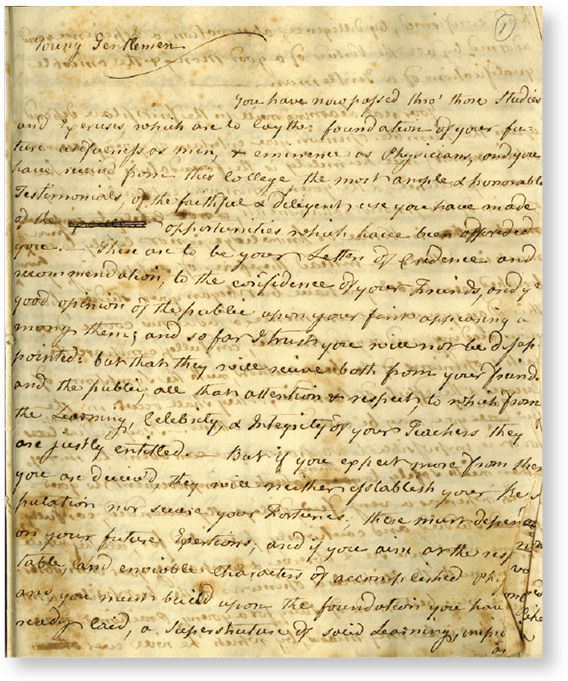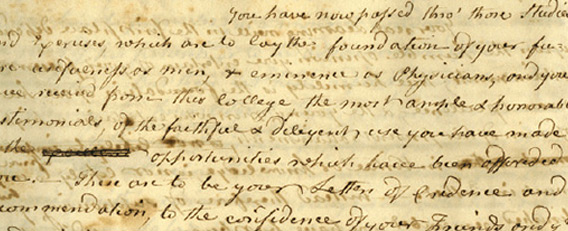Library Acquires Third Samuel Bard Manuscript
The Health Sciences Library has acquired a handwritten manuscript by VP&S founder and prominent early American physician Samuel Bard. The 20-page document is the text of an unpublished commencement address given by Dr. Bard to the graduates of the college, probably around 1818.
Dr. Bard, a proponent of lifelong learning, warned his audience of new physicians that “instead, therefore, supposing you have finished, remember you have but begun your studies.” He went on to say that “the young man who entertains a high opinion of
his present attainments in virtue or knowledge is not likely to improve in either.” Dr. Bard urged his audience to be “gentlemen,” characterized not by “artificial varnish” but rather by “genuine effusions of a good Heart.”

This is the third Bard manuscript acquired by the Health Sciences Library. Several years ago it purchased the draft of his 1811 opening day address, “Discourse on the Importance of Medical Education,” and in 2017 it acquired his 1819 report to the New York State Board of Regents, “Remarks on the constitution, government, discipline & expences [sic] of medical schools.” In addition, the library has over the past 20 years purchased most of Dr. Bard’s published works, including “Enquiry into the nature, cause and cure, of the angina suffocativa, or, sore throat distemper” (1771), an important work on diphtheria; the 1810 French translation of that work; and the first edition (1807) of “Compendium of the theory and practice of midwifery,” the first textbook on the subject by an American.
Samuel Bard studied first at King’s College (now Columbia) before receiving his medical degree from the University of Edinburgh in 1765. He was one of six physicians in New York City who persuaded King’s College in 1767 to establish a medical school, now the Vagelos College of Physicians and Surgeons, the second oldest in the United States. Dr. Bard served as dean and professor of medicine until its closure in 1776 due to the War of Independence. After the newly renamed Columbia College revived the medical school in 1791, he served first as dean and later as president of the college until his death. Bard Hall, the VP&S residence hall, is named for him.
Besides his involvement with the medical school, Dr. Bard was one of the founders in 1771 of New York Hospital, now part of NewYork-Presbyterian Hospital, the primary teaching hospital of VP&S.
“The new manuscript is in generally good condition though it will require treatment by conservators to prevent paper loss,” says Stephen E. Novak, head of Archives & Special Collections. “Once this work is complete, the manuscript will be available for study and exhibition.
- Log in to post comments


